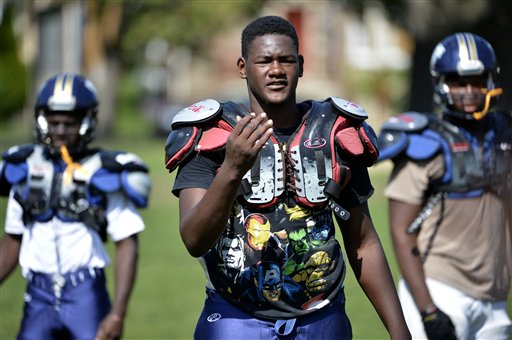By BARBARA RODRIGUEZ
Associated Press
CHICAGO
Deandre Welch understands how a teachers strike might cause him to miss a few high school football practices and even a scheduled game. But the senior wide receiver certainly didn’t think the walkout would threaten his plans to pay for college.
The strike in the nation’s third-largest school district could have unintended consequences for Chicago students whose college dreams are tied to their actions on the playing field. And though the city’s school district and union negotiators appeared headed toward a resolution that could end the walkout this weekend, student-athletes citywide have fretted about the high stakes involved.
As a captain of the team at Foreman High School on the city’s West Side, Johnny Daniels didn’t wait for a strike resolution to get back on the field. He knew his teammates needed to practice.
So he called them. Or he tweeted. He sent text messages and left Facebook posts. He did whatever he could to get athletes to come out for unofficial practices, which have been going on daily, without any coaches, since the strike began.
Daniels said the strike, which has canceled a week of classes for more than 350,000 students, has frustrated high hopes for the season.
For now, the strike has meant canceled practices and games for the 11,000 students enrolled in fall varsity sports, which include golf, soccer, softball and volleyball.
But the effects will widen if classes don’t resume soon, said officials with Chicago Public Schools. Late last month, the district requested a waiver from the Illinois High School Association to allow sports activity despite a possible strike. The waiver was denied Monday, the first day of the strike.
The association reiterated a longstanding rule that schools cannot participate in sports during a teachers strike. Executive Director Marty Hickman said the bylaw has been in place for years during strikes in other districts.
Welch, a senior from Westinghouse College Prep on the city’s West Side, said he was excited about the strike until it canceled his team’s Saturday game.
In a letter to Hickman, Chicago schools Chief of Staff Robert Boik said the strike could force game forfeits that may jeopardize playoff and championship opportunities and even the academic success of students whose college education may depend on athletic scholarships.
In their world, sports are part of a bigger plan for improving their lives and livelihood.
A prolonged strike could have the greatest impact on football. High schools are required to play nine games to be considered for state playoffs. District officials said there are plans to make up missed games, but that gets more complicated by IHSA rules that specify the number of practices before games resume.
The longer the strike drags on, the longer the hold on resumed play.
Alondre Pickens, a junior playing football at Curie Metropolitan High School in southwest Chicago, said he’s hit the gym daily so he can be ready to play in case a resolution is reached over the weekend.
But he said the strike definitely has affected his ability to play and receive coaches’ feedback _ the kind that will help him determine if he’ll play the sport in college.
Though the IHSA denied the school district’s request for a waiver, there is a rule that would allow the Chicago school board to approve sports practices with credentialed staff. That proved difficult in the first days of the strike, since 90 percent of coaches are union members.
Hickman isn’t surprised to hear that some students ran their own practices.

COMMENTS
Please let us know if you're having issues with commenting.